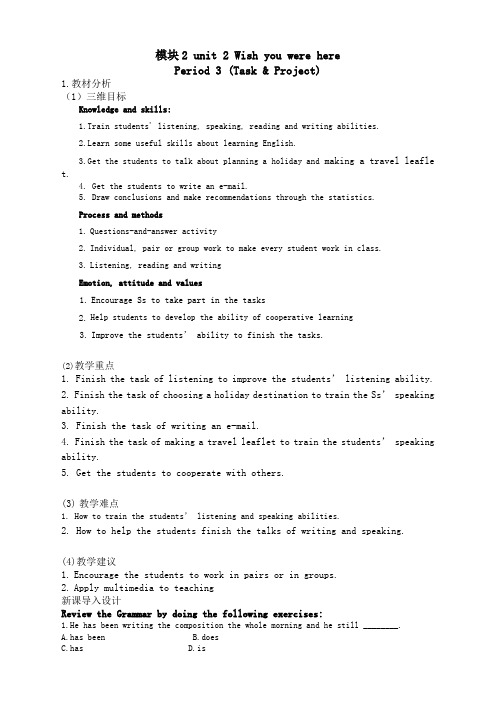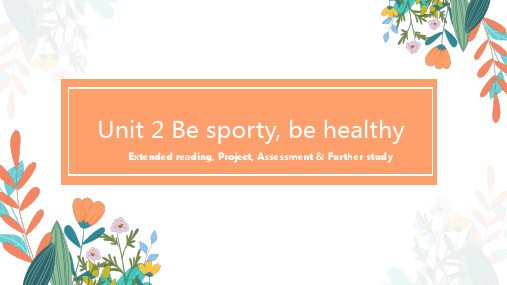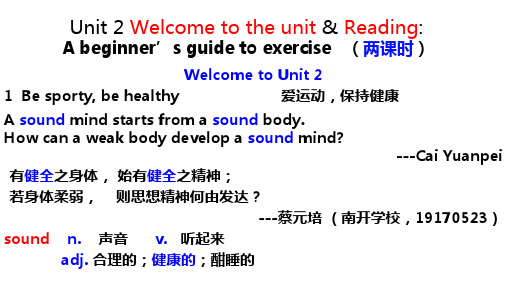高中译林牛津英语模块二Unit2教案
英语必修ⅱ牛津译林版unit2教案2

模块2 unit 2 Wish you were herePeriod 3 (Task & Project)1.教材分析(1)三维目标Knowledge and skills:1.Train students' listening, speaking, reading and writing abilities.2.Learn some useful skills about learning English.3.Get the students to talk about planning a holiday and making a travel leafle t.4. Get the students to write an e-mail.5. Draw conclusions and make recommendations through the statistics.Process and methods1.Questions-and-answer activity2.Individual, pair or group work to make every student work in class.3.Listening, reading and writingEmotion, attitude and values1.Encourage Ss to take part in the tasks2.Help students to develop the ability of cooperative learning3.Improve the students’ ability to finish the tasks.(2)教学重点1. Finish the task of listening to improve the students’ listening ability.2. Finish the task of choosing a holiday destination to train the Ss’speaking ability.3. Finish the task of writing an e-mail.4. Finish the task of making a travel leaflet to train the students’ speaking ability.5. Get the students to cooperate with others.(3)教学难点1. How to t rain the students’ listening and speaking abilities.2. How to help the students finish the talks of writing and speaking.(4)教学建议1.Encourage the students to work in pairs or in groups.2.Apply multimedia to teaching新课导入设计Review the Grammar by doing the following exercises:1.He has been writing the composition the whole morning and he still ________.A.has beenB.doesC.hasD.is2.If city noises ________ from increasing,people ________ shout to be heard even at the dinner table 20 years from now.A.are not kept; will have toB.are not kept; have toC.do not keep; will have toD.do not keep; have to3.The price ________,but I doubt whether it will remain so.A.went downB.will go downC.has gone downD.was going down4.—How long ________ each other before they ________ married?—For about a year.A.have they known; getB.did they know; getC.do they know; are going to getD.had they known; got5.You can’t move in right now.The house ________.A.has paintedB.is paintedC.is being paintedD.is paintingKEYS: DACDC。
Unit2 Lesson7 Project 教案- 高二英语译林牛津版选择性必修第二册

《英语》(选择性必修-第二册)Unit 2 Sports cultureProjectI.Learning objectivesBy the end of the lesson, students will be able to:1.get to know different sportspersons around the world;2.research reliable information and write a fact file about a sportsperson;3.cooperate and communicate better with group members.IL Key competence focusWrite a fact file using specific language and following the given format.III. Predicted areas of difficultyHow to summarize a person's career and achievements.IV Teaching proceduresStep 1 Lead-in1.Free talkT asks Ss to brainstorm some sportspersons by asking the following questions:•Who is your favourite sportsperson?•Why do you like him/her?•Can you introduce him/her?2.Task assignmentT: Boys and girls, do you love sports? Today's class we'll discuss your favorite sports stars and learn how to write a fact file about him/her.【设计意图:教师引导学生说出自己喜欢的体育明星,激发学生的兴趣,快速进入本堂课的主题,并设定本堂课的任务。
英语ⅰ译林牛津版unit2period8~9精品教案

英语ⅰ译林牛津版unit2period8~9精品教案整体设计教材分析Thepurposeofthisteachingperiodistotrainthestudents’listeningability,speakingabilityandwritingability,aswellasreadingability.What’smore,studentscanalsolearnthepracticalabilitytoknowhowtopresentadialogue.Thisse ctionconsistsofaseriesofactivities,whichprovidestudentswithopportunitiestopract icetheirlanguageskillsoflistening,reading,speakingandwriting.Itismadeupofthreek indsofskillbuilding,includingunderstandingtonesinspokenEnglish,readingforthegis tandwritingadialogue.Besides,thereisalsoaskillbuildingactivityineachstep.Throug hthethreesteps,studentswilllearntosolveapracticalproblemintheirdailylife,thatis ,howtopresentadialogueproperly.Teacherscanalsodividethetaskintothreepartsforthreeteachingperiodsaccordingt othestudents’ability.Inthefirstperiod,teacherscanfocusonlisteningskilltotrainthestudentshowt ounderstandtonesinspokenEnglish.Inthesecondperiod,theteachingimportantpointisto trainthestudents’readingabilitytoenablethestudentstohowtounderstandthegistorthemainpointbyfastre ading.Inthethirdteachingperiod,teachersareadvisedtoputanemphasisontrainingwriti ngability.Letthestudentsknowhowtowriteadialogueandwhattheyshouldpayattentiontow hilepresentingadialogue.Theteachingimportantanddifficultpointistohelpthestudent slearnhowtowriteadialogueproperly.Ifthestudentshaveahighlevel,teachersareadvise dtospendoneteachingperiodfinishingthetask.Ifnecessary,teacherscanpreparemorelis teningmaterialstoreachthegoaltoimprovestudents’listeningability.Astospeakingandreadingabilities,theteacherhadbetterencourageal lthestudentstotakepartinclass-activities.Whilepreparingtopicsorsituations,tryto choosetheonesthatstudentsareinterestedinandensureeverystudenttohaveachancetospe akanddiscuss.三维目标Tohelpthestudentstolearnaboutsomethingonhowtopresentadialogueproperly.ToenablethestudentstolearnhowtonesareusedinspokenEnglishtoexpressdifferentf eelings.Tohelpthestudentstolearnhowtoreadforgistorthemainpoints.Toenablethestudentstowriteandpresentadialogue.Tohelpthethestudentslearnhowtounderstandthefeelingsofspeakersandhowtopresen tadialogue.重点难点1.Tohelpstudentslearnhowtojudgethespeakers’feelingsfromtheirfalling,risingandflattones.2.Toletstudentslearnhowtoreadforgistormainpoints.3.Tohelpstudentstellthespeakers’feelingtoimprovetheirlisteningability.4.Tohelpstudentsmasterthereadingability—readingforgist.5.Tomakestudentsknowabouthowtopresentadialogueproperly.教学方法1.Listeningtotapeandansweringsomequestions.2.Discussioninpairsoringroups.3.Task-basedin-classactivities.4.Explanationofsomelanguagepoints.教具预备Ataperecorderandthemultimedia.课前预备1.Askstudentstoconsiderthefollowingthreequestions:WhatpartdotonesplayinspokenEnglish?Whyisbeingabletounderstandthegistorthemainpointconsideredtobethemostimporta ntpartofreading?Whatpointsshouldbekeptinmindwhenwewriteadialogue?2.Ifpossible,teacherscanpreparesomewonderfuldialoguesinsomefilmsandletthest udentslistentothemandtellthespeakers’feelingsaccordingtotheirdifferenttones.3.Beforeclass,askthestudentstogooverhowtousearelativepronounproperly.教学过程→Step1GreetingWhilegreeting,teacherscanintendtousesomeexpressionswithattributiveclauses.T eacherscanalsoencouragestudentstoanswersomeeverydayEnglishwithattributiveclause s.→Step2RevisionCheckthehomeworkandreviewtheusageofrelativeadverbs.Theimportantteachingaimo flastteachingperiodistoknowhowtousearelativeadverbproperly.Letstudentsrecallthe definitionofarelativeclause.TherelativeadverbsofEnglishare:when,where,why.Teach ersshouldoffersomepracticetostudentstogooverinwhatconditionwhen,whereandwhyareu sedtointroduceattributiveclausesandwhen,whereandwhycanbereplacedbyapreposition+ whichinformalEnglish.Afterthat,askstudentstofinishthefollowingexercises.1.Fillintheblankswithproperprepositiontocompletethesentences.1)Heistheman_____________youshouldgiveyourthanks.2)Thefarm_____________whichweworkedtenyearsagoisn’twhatitusedtobe.3)Thisisthetree_____________whichweusedtoplaygames.4)Thehunter,_____________whomatigerwasshot,hasbeenpunished.5)WuDong,_____________whomIwenttotheconcert,enjoyeditverymuch.6)Thepen_____________whichheiswritingnowwasbroughtyesterday.7)Thegas_____________whichwecannotliveiscalledoxygen.8)Thelittlecreature_____________whichscientistsareinterestedisknownasET.pletethefollowingsentencesusingwhich,why,whereorwhen.1)Hangzhouistheplace_____________Iwentformyholidaylastsummer.2)Hereadthebook_____________hissisterhadtoldhimabout.3)Thereason_____________Peterissohappyisthathepassedtheexam.4)Iremembertheday_____________myfatherdied.Iwasonlytenyearsoldatthattime.5)Pleasegivemethereason_____________youwerelatethistime.6)Iwillgobacktotheplace_____________Igrewupandlivethereforever.3.Rewritethefollowingsentencesusingwhere,which,when,orwhy.1)TheschoolyearstartsonthefirstdayofSeptember.ThefirstdayofSeptember______________________.2)Mybrotherstoppedsmokingbecauseitisbadforhishealth.Thereason______________________.3)WewenttoShanghaionourschooltrip.Thecity______________________.4)ImostlikethelatenightshowonTV.TheTVprogram______________________.5)Myfatherworksinafactorythatmakestelephones.Thefactory______________________.6)Shedidherhomeworkinthisroom.Thisis______________________.Suggestedanswers:1.1)to2)on3)under4)by5)with6)with7)without8)in2.1)where2)which3)why4)when5)why6)where3.1)TheschoolyearstartsonthefirstdayofSeptember.ThefirstdayofSeptemberisthedaywhentheschoolyearstarts.2)Mybrotherstoppedsmokingbecauseitisbadforhishealth.Thereasonwhymybrotherstoppedsmokingisbadforhishealth.3)WewenttoShanghaionourschooltrip.ThecitywherewewenttoonourschooltripwasShanghai.4)ImostlikethelatenightshowonTV.TheTVprogramwhichImostlikeisthelatenightshow.5)Myfatherworksinafactorythatmakestelephones.Thefactorywheremyfatherworksmakestelephones.6)Shedidherhomeworkinthisroom.Thisistheroomwhereshedidherhomework.→Step3Listeningtoaradiophone-inprogramActivity1Lead-inBrainstorming:Askstudentsthefollowingquestion:Howcanweknowthespeaker’sfeelingandrealmeaningbylistening?ThentellSsthattonescantellhowaspeakerisfeelingjustaswordscantellusthemoodof awriter.Makesurethattheyunderstanditisimportanttopaycloseattentiontowhatheorshe issayingtoselecttheinformationyouwantaccordingtothesentencesindifferenttonesand decidewhichemotionalmeaningeachtoneshows.Activity2UnderstandingtonesinspokenEnglishFirst,introducetheuseoftonesinspokenEnglishtostudents.Enablethestudentstoun derstanddifferenttonestoexpressdifferentfeeling.Say“standup”tooneofthestudentsusingdifferenttonesandletothersguesswhatfeelingstheteacherist ryingtoexpress.Standup.(usingflattone)Standup.(usingfallingtone)Standup.(usingrisingtone)Teachersletthestudentsguesswhatfeelingheorsheisexpressingwitheachsentence.S:Thefirstoneshowsthatyousimplyaskhimtostandupwithoutanyspecialfeeling.Thes econdoneshowsthatyouareangrywithhimandheorshemaybedoingsomethingthathasnothingt odowithclass.Thethirdoneshowsthatyouareverykindandpolitelyaskhimorhertostandup.Afterhearingwhatthestudentssay,teacherscandrawaconclusionthatdifferenttones areusedtoexpressdifferentfeelings.Generallyspeaking,therearethreetypesoftones:t hefalling,risingandflattones.Second,askSstoreadtheguidelinesinSkillsbuilding1onpage32beforelisteningtoth efiveversionsofthesamesentenceindifferenttones.Theywillseethattherearefourmainp ointstodeterminehowthespeakerisfeeling.Writedownthefourpointsontheblackboard: thevolumeofthelanguagetherisingoffallingtone(liketonesusedin Putonghua)stressoncertainwords.thepausesinthesentencesThenaskthestudents“whatfeelingsdothesestandfor?”Answers:Generallyspeaking,thefallingtone—angryordispleasedthepause&therisingtone—politetherisingtone—questioningstressed&afallingtone—angryaflattone—expressingafactThird,haveSslistentheexamplesentenceinfivedifferenttonesonebyone.Aftertheyl istentooneofthem,askthemtotellwhattheythinkaboutthespeaker’semotion.Isshehappy,orangry?Issheinhighspiritsorinlowspirits?Thenletthemreadthe explanationforeachsentence.Fourth,haveSsreadthesentence“Hewillcomeheretomorrow”indifferentemotions.Askthem:Ifsomeoneishappyabouthiscoming,howwillhesayit?Ifsomeonedoesn’twanthimtocome,howwillhesayit?Ifsomeoneisexcitedabouthiscoming,howwillhesayit?Ifsomeoneisfrustratedorquestioning,howwillhesayit?Fifth,letSslistentothetapeandfinishPartAonpage32.Writethemostcorrectemotion almeaningineachblank.Beforeplaythetape,checkwhetherstudentsknowthemeaningsofthelasttwowords “frustrated”and “questioning”.Explainthemeaningstothemorallyorwritethedefinitionsontheblackbo ard.Frustrated:feelingannoyed,upset,andimpatient,becauseyoucannotcontrolorchang easituation,orachievesomething.Questioning:aquestioninglookorexpressionshowsthatyouhavedoubtsaboutsomethin gorneedsomeinformation.Thenplaythetapeandintheendchecktheanswerswiththewholeclass.Answers:1)questioning2)frustrated3)excited4)sadSixth,askSstolistentothetapeandfinishPartB.Thenletthemlistentothefivesenten cesagainandaskthemtotellwhichwordisemphasizedandwhattonesareusedfordifferentemo tions.Answer:Hetoldmethetesthadbeenputoff.(Sheneitherlikesnortrustshim.Shemaywishsomeoneelsehadbeentheonetotellher.) Seventhpractice用恰当的语调朗读以下句子,体会它们所表达的情感意义。
新牛津译林版高中英语选择性必修二Unit2Sports Culture-Reading课件

Part 1: Paragraph 1: Introduction
Part 2: Paragraphs 2-3: Subheading 1:History of the Olympics
Part 3: Paragraphs 4-5: Subheading 2 Famous Olypians
Listen to the tape of paragraphs 2-3 and fill in the blanks according to what you heard.
The ancient Olympic Games began in the year _7_7_6_B_C__E__. During the early Games,only Greek _m__e_n__ were allowed to participate. They competed in such events as b__o_x_in_g___, _ru__n_n_in_g_ andt_h_e_l_o_n_g_j_u_m_.pThe ancient Olympic Games were held at Olympia in Greecee_v_e_r_y_f_o_u_r_y_e_a_r_sfor almost _1_2____centuries, until they eventually died out around the year _3_9_3_______.
Part 4: Paragraph 6: Subheading 3 China’s achievements in the Olympics
Part 5: Paragraph 7: Conclusion
高中英语牛津译林版(2020)必修第二册Unit 2 教学PPT课件

Extended reading, Project, Assessment &am1. satisfaction to one's satisfaction=to the satisfaction of sb. 令某人满意的是 with satisfaction 满意地;欣慰地 satisfy vt.使满意,使满足 satisfied adj.满意的,满足的 be satisfied with... 对……感到满意 satisfying adj. 令人满意的 satisfactory adj. 令人满意的 练习:He was purring with _s_a_ti_sf_ac_t_io_n_.
he felt tai chi classes were fun and easy, not like what he had thought before. The third one is
“bored”. After learning the basics of tai chi in those first few classes, he found herself aching
2. hesitate hesitate to do sth. 犹豫做某事 hesitate about/over (doing) sth. 对(做)某事犹豫不决 hesitant adj.犹豫的 without hesitation 毫不犹豫地 hesitation n. 犹豫 have no hesitation in doing sth. 毫不犹豫地做某事 练习:Simon saw she was___h_es_it_a_ti_ng__ and pressed home his advantage.
Unit 2 Welcome to the unit课件-高中英语牛津译林版(2020)必修第二册

Foods like noodles, rice,fruit and vegetables give your body plenty of carbohydratesto keep up your energy.
After exercise,you need to eat foods rich in protein such as fish, eggs and milk products.
How can a weak body develop a sound mind?
---Cai Yuanpei
有健全之身体, 始有健全之精神;
若身体柔弱, 则思想精神何由发达?
---蔡元培 (南开学校,19170523)
sound n. 声音 v. 听起来
adj. 合理的;健康的;酣睡的
2 Q: What do soccer players and magicians have in common? A: Both do hat-tricks!
2 What do we know from
?
C
A physical activity can prevent heart and lungs working too hard.
B exercise is only good for physical health in the long term.
A Figuring out your expectations. B Having a physical examination
C Developing your physical health D Stretching your muscles A
4 Why does the author compare your body to a car? A
2022_2023学年新教材高中英语Unit2TheUniversa教案牛津译林版选择性必修第一册

Unit 2The universal languageExtended readingI. Learning objectivesBy the end of the lesson, the students will be able to:1.learn about Beethoven’s life and his works;2.discuss the personality of Beethoven;3.master the writing techniques of this article.II. Key competence focusL earn about Beethoven’s life and his works.III. Predicted area of difficultyMaster the writing techniques of this article.IV. Teaching proceduresStep 1 Lead-inT plays a Quiz with Ss to arouse their interest in the well-known musician:T lists relevant information and encourages Ss to guess the name of the musician. 【设计意图:学生通过猜名人游戏对即将阅读的故事主人公相关信息有一定的了解,同时吸引学生对高雅艺术的求知欲望,为下一步分析人物品质打下基础。
】Step 2 Global reading1. T asks Ss to go through the passage quickly and sum up the main idea of each paragraph.2. T encourages Ss to analyze the structure of the passage.【设计意图:指导学生通过获取、概括、整合等思维活动定位归纳段落主题句,概括段落大意,学会从宏观层面把握文脉,理清语篇整体结构,快速找出文章主旨,培养学生查找、处理、整合信息的能力。
高一英语新课标模块2 UNIT2 THE OLYMPIC GAMES-新人教[整理] 人教版 - 译林牛津版 .ppt
![高一英语新课标模块2 UNIT2 THE OLYMPIC GAMES-新人教[整理] 人教版 - 译林牛津版 .ppt](https://img.taocdn.com/s3/m/e863b53cb90d6c85ec3ac685.png)
Grammar and Writing
Active and Passive Voice Voice 语态,英语中语态分为主动语态及被动 语态 Active Voice 主动语态 The student wrote a song. Passive Voice 被动语态 be done A song was written by the student.
The Future Passive Voice
They will discuss this problem at their next conference. This problem will be discussed at their next conference.
一般将来时的被动语态:shall/will +be+v.p.p will be built (build) e.g. A new car factory ____________ in our city.
Changing the verb involves three steps: 1. 确定原句时态,改成相应的be动词时态; 2. 后, 3.检查新的动词和新的主语主谓是否一致
We/design/the car(s)
Forming Tenses of Passive Verbs
Changing a sentence from the active voice to the passive voice involves 3 steps: 1. 把主动语态中句子的直接宾语做为被动语态 的主语 . 2. 把原主动语态的主语改成宾格移到句末,用 by连接(也可省略) . 3. 改变动词.
Make sentences using the passive voice.
- 1、下载文档前请自行甄别文档内容的完整性,平台不提供额外的编辑、内容补充、找答案等附加服务。
- 2、"仅部分预览"的文档,不可在线预览部分如存在完整性等问题,可反馈申请退款(可完整预览的文档不适用该条件!)。
- 3、如文档侵犯您的权益,请联系客服反馈,我们会尽快为您处理(人工客服工作时间:9:00-18:30)。
高中译林牛津英语模块二U n i t2教案-CAL-FENGHAI-(2020YEAR-YICAI)_JINGBIANModule2, Unit2 教学设计课题 AWE M2 U2 主备人杨注:目标要求可参阅南京外国语学校仙林分校《英语教学实施纲要》第四部分“目标内容”中的相关描述。
课时主备教案课型 Welcome + Word powerLearning objectives:2After learning, students will be able to1. know what an adventure is;2. tell some activities of adventure;3. remember some items we have to prepare for adventures;4. know the functions of the necessities and how to use them in some situations.Learning difficulties:1. names of all the necessities functions2. proper necessities and the preparation according to different situationsLearning methods:1.PPT2.blackboardLearning procedures:3课型 Reading(I)Learning objectives:By the end of this period, students will be able to1.predict the contents of a passage based on the title, the first paragraph and some adjectives;2. grasp the main idea of each paragraph accurately;3. think critically by raising some questions concerning the passage;4. know more about the mummies, the Pyramids and Egypt.Focus of the lesson:1. the new words and phrases in this article2. the main idea of each paragraph4Predicted area of difficulties:comprehension about how the deaths happened Learning methods:1. PPT2. blackboard5课型 Reading(II)Learning objectives:At the end of this period, students will be able to1. write out the transformation and phrases of the key words correctly ;2. use the key words properly in relevant exercises;3. make up a short passage with these words reasonably and accurately. Focus of the lesson:usage of the key wordsPredicted area of difficulties:1. th e usage of the phrase ‘in case’2. the difference betw een words ‘close’ and ‘closely’3. the proper usage of the words in the compositionLearning aids:1. PPT2. blackboardLearning procedures:6What will you do to relax yourself?1.I went to a live concert to relax myself.*Have you ever been to any concert Lastyear, I planned to go to Fish Liang’sconcert. arrange, arrangement2.What should I do to make arrangements forthis activity in advance3.*What will you take with you include (cf.contain)4.Can you guess why I took my umbrella incase5.My friend Alice usually takes pepper spraywith her. defence, defend scare,scared, scared6.*What arrangements should the organizer ofthe concert make supply7.The sticks shine beautifully. in the dark*If you were a singer, how will you appearon the stage?8.9.*Whom will a singer invite to her live showusually close, closely10.Fish rode on a blue dolphin, which reallysurprised us. v-ing课型 Grammar & UsageLearning objectives:By the end of this period, students will be able to1. understand the grammatical meanings of the future continuous tense and future in the past accurately;2. employ the future continuous tense and future in the past correctly in various situations.7Focus of the lesson:understand the grammatical meaning the two tensesPredicted area of difficulties:1. the usage of future continuous tense in proper situations2. the usage of different forms of future in the past properly Learning aids:1. PPT2. blackboard1.How to form the future continuoustense (PPT4-19)In statement: Sb. will (not) be doingsth.In questions: Will sb. be doing sth.In short answers: Yes, sb. will./No,sb. will not (won’t).2.How to employ future continuous tensein proper situationsbeing used in progress over a periodof time in the future.being used happening at a certaintime in the future.making polite enquiries about otherpeople’s future plans.3. How to form future in the past(PPT21-28)would dowas/were going to dowas/were to dowas/were about toas/ were doing4. How to employ future in the past inproper situationsexpressing a future arrangement orevent in the pastexpressing a future intention or planin the past8expressing the immediate future inthe pastexpressing that the future actionactually happenedexpressing a future arrangement oraction in the past课型 TaskLearning objectives:By the end of this lesson, students will be able to1. question appropriately by using what, where, when, why, how, how long, how much etc. and master how to answer;2. write down the dates and places accurately and grasp information by reading and listening;3. present a dialogue between family members about the family travel plan, using appropriate questions and answers;4. write an e-mail.Focus of the lesson:1. questions in appropriate ways2. notes-taking by reading and listeningPredicted learning difficulties:1. a dialogue between family members about the family travel plan, using appropriate questions and answers.2. writing an e-mail to Dad telling him about the family travel plan Learning aids:1. PPT2. tape and tape recorderLearning procedures:9课型 ProjectLearning objectives:By the end of this period, students will be able to:1. figure out certain information in a travel leaflet accurately;2. describe the meaning and the beautiful scenery of Shangri-la perfectly;4. make their own travel leaflets in a proper and attractive way.Focus of the lesson:1. a comparison of main characteristics between Zhongdian and Shangri-la2. design of a travel leafletPredicted learning difficulties:design of a travel leafletLearning aids:1. multi-media courseware(PPT)2. blackboard10课型 Revision of U2Learning objectives:By the end of this period, students will be able to1. put basic vocabulary of the unit into practical use correctly;2. summarize the usages of the language points as well as use them properly;3. use the right key words and phrases with different future tenses to complete the translation.Focus of the lesson:1. the usages of the key words and phrases2. the usages of different forms of future tense in a specific situation Predicted area of difficulties:the summary of the usages of language points.Learning methods:1. PPT2. blackboardLearning procedures:。
